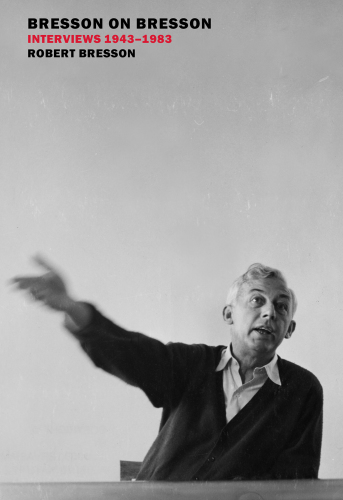
Bresson on Bresson
Interviews, 1943-1983
کتاب های مرتبط
- اطلاعات
- نقد و بررسی
- دیدگاه کاربران
نقد و بررسی

June 20, 2016
What strikes one about this illuminating collection of interviews with revered French filmmaker Robert Bresson (1901–1999), edited by his widow, Mylène, is the unwavering consistency of the philosophy. Thoughts appear time and again, always just a bit more refined—just like his films. In several interviews, Bresson explains the unaffected performances he elicited by saying he tells his actors, “When you’re talking, talk to yourself.” Not that there is much dialogue in his famously spare work; in 1960 he states, “What I’m trying to do is to come up to the edge of saying too little, in order to try to express what other films express with words instead with silence.” He repeatedly compares directing to painting, his first métier, observing that the relationship between colors makes meaning in paintings; likewise, the juxtaposition of images makes meaning in filmmaking. One would be hard pressed to find more than a few interviews where he doesn’t speak against the cinema of the time—which he refers to as “filmed theater.” Cinephiles will delight in reading this book and following Bresson’s thinking as it develops further and makes each interview more compelling than the last.

Reflections of a cinematic grandmaster.Robert Bresson (1901-1999) was one of the few directors of France's cinematic old guard to be taken up by the iconoclastic French New Wave filmmakers, as the upstarts admired his exacting and poetic aesthetic and his commitment to the idea of pure cinema. In these short interviews, Bresson, who was given to such gnomic proclamations as, "sound cinema invented silence," proves to be a deeply analytical thinker who nonetheless puts a premium on intuition and instinct. In landmark films including Pickpocket (1959) and The Trial of Joan of Arc (1962), the director famously eschewed theatrical notions of "acting," casting nonprofessionals in the interest of capturing authentic behavior. Measured, austere, and elegant in their simplicity, Bresson's films produce profound emotional effects. The extent to which the filmmaker was conscious of every aspect of his craft in achieving those effects, as well as his enduring, passionate dedication to better understanding and expanding his tools, is on illuminating display in these conversations. Most compelling is an extended exchange with New Wave enfant terrible Jean-Luc Godard, whose interrogation of Bresson reveals a penetrating and nuanced appreciation of the older man's films and provides a poignant reminder of the heady, collaborative, intellectual community that was the film culture of the mid-1960s. Bresson's monklike devotion to his idea of "pure" cinema wavers not a bit over the course of the four decades represented here, but it is his optimism and faith in his medium that inspire the greatest admiration. The book ends with this statement from Bresson, made in 1983, with 40 years of revelatory cinema behind him: "The cinema is immense. We haven't done a thing." That's not an admonition; it's an invitation.A terrific encapsulation of the philosophies and techniques behind the cinematic masterpieces of Robert Bresson, from the man himself. COPYRIGHT(1) Kirkus Reviews, ALL RIGHTS RESERVED.

























دیدگاه کاربران